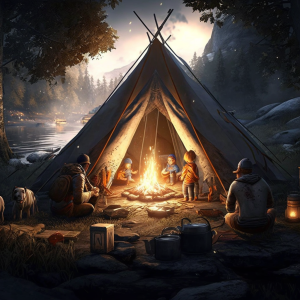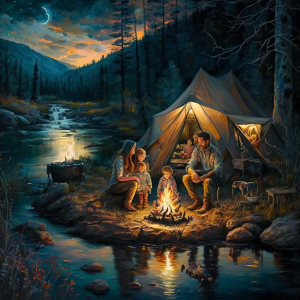 Spring Camping
Spring Camping
Spring camping with its lengthening evenings and rising temperatures can be a wonderful way to enjoy the outdoors after a long winter. Here are some tips for a successful spring camping trip:
- Check the weather forecast: Spring weather can be unpredictable, so make sure to check the forecast before you go. Bring layers of clothing to accommodate for temperature changes and pack rain gear in case of wet weather.
- Choose the right campsite: Look for a campsite that is open in the spring and has amenities such as a fire pit or grill, a picnic table, and running water. Make sure to reserve your campsite ahead of time.
- Pack appropriate gear: Bring a tent that is suitable for spring weather conditions and has enough space for everyone. Bring warm sleeping bags, sleeping pads, and extra blankets to stay warm at night. Don’t forget to pack a first aid kit, insect repellent, and sunscreen.
- Plan your meals: Plan your meals ahead of time and bring a portable stove, utensils, and cooking equipment. Bring snacks and drinks to keep you energized throughout the day.
- Be mindful of wildlife: Spring is a time when wildlife is active, so be respectful and keep a safe distance. Store your food in a secure container and keep your campsite clean to avoid attracting animals.
- Practice Leave No Trace principles: Leave your campsite better than you found it by packing out all trash and disposing of it properly. Be mindful of your impact on the environment and stay on designated trails.
- Enjoy the scenery and activities: Spring camping offers the opportunity to explore nature and participate in outdoor activities such as hiking, fishing, and birdwatching. Take time to relax and enjoy the beautiful scenery around you. You may wish to carry a camera with you to record what you see.
Spring camping can be a fun and rewarding experience, but it’s important to be prepared and practice responsible camping habits. By following these tips, you can have a successful and enjoyable spring camping trip.
Be Prepared
Spring camping can be a wonderful way for families with young children to enjoy the outdoors and create lasting memories. Here are some ideas to make your spring camping experience with young children enjoyable and safe:
outdoors and create lasting memories. Here are some ideas to make your spring camping experience with young children enjoyable and safe:
- Choose a family-friendly campground: Look for a campground that is family-friendly and has amenities such as playgrounds, hiking trails, and activities for children. Make sure the campground has flush toilets and running water for convenience.
- Bring appropriate gear: Pack suitable camping gear for the whole family, including a tent, sleeping bags, warm clothes, rain gear, and appropriate footwear. Don’t forget to bring extra blankets, pillows, and a first aid kit.
- Plan for meals: Plan your meals ahead of time and bring a portable stove, utensils, and cooking equipment. Make sure to bring snacks and drinks for children to keep them hydrated and energized.
- Plan activities: Plan activities such as hiking, fishing, birdwatching, and exploring nature. Bring games, books, and toys to keep children entertained during downtime. Remember, the internet is not available everywhere and books and games are always a good backup.
- Stay safe: Be mindful of safety precautions such as campfire safety, water safety, and wildlife safety. Keep children within your sight and supervise them at all times.
- Be prepared for the weather: Check the weather forecast before you go and pack clothes accordingly. Bring warm layers for chilly evenings and rain gear for wet weather. In some areas, spring weather means mountain thaw water floods, check the forecasts.
Spring camping with young children can be a fun and exciting adventure. By following these tips, you can make sure your family has a safe and enjoyable time in the great outdoors.
Camping With Children
Camping can be a great way for families to spend time together and create lasting memories. However, it’s important to keep children safe while camping. Here are some tips for keeping children safe while camping:
-
- Choose a family-friendly campground: Look for a campground that is family-friendly and has amenities such as playgrounds, hiking trails, and activities for children. Make sure the campground has flush toilets and running water for convenience.
- Keep children within your sight: Children should be supervised at all times, especially around campfires, bodies of water, and when exploring the campground. Assign a responsible adult to watch over the children and make sure they don’t wander off.
- Teach children about camping safety: Teach children about camping safety rules such as staying on designated trails, avoiding wildlife, and not touching poisonous plants. Encourage them to report any concerns or potential hazards to a responsible adult. Have some check sheets prepared beforehand, with quizzes or items to find in a treasure hunt.
- Prepare for emergencies: Bring a first aid kit and know how to use it. Teach children basic first aid skills such as how to clean and bandage a wound. Make sure everyone in the family knows what to do in case of an emergency and has a way to call for help if needed.
- Store food and garbage properly: Keep food stored in airtight containers or a bear-resistant canister. Don’t leave food or garbage out, as it can attract wildlife. Teach children about the importance of keeping a clean campsite to avoid attracting animals.
- Bring appropriate gear: Pack suitable camping gear for the whole family, including a tent, sleeping bags, warm clothes, rain gear, and appropriate footwear. Don’t forget to bring extra blankets, pillows, and a flashlight.
By following these tips, you can keep children safe while camping and ensure that everyone in the family has a fun and enjoyable experience in the great outdoors.